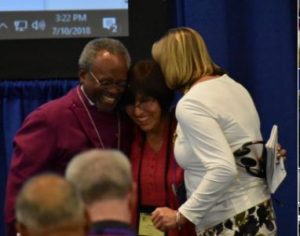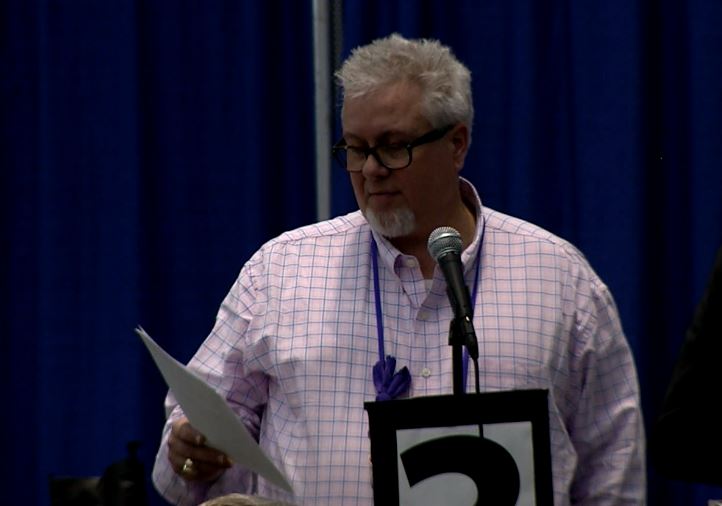Viva Cuba!
The House of Bishops passed A238 Admitting Episcopal Diocese of Cuba as a Diocese of Episcopal Church and welcomed their bishop, the Rt Rev María Griselda Delgado del Carpioto, to a seat in the House. The resolution comes from a vote taken at the synod of the diocese of Cuba in 2015. The diocese was originally a TEC diocese but became separated in the hostile environment between the US and Cuba after Castro’s revolution. The diocese has been an independent diocese, without Provincial affiliation for over 50 years.
The resolution also includes provision for clergy in Cuba to join the Pension plan (as well as a direction to CPG to figure out how to fund the past service liability accrued by the active clergy in Cuba) and sets aside $400,000 for ministry and mission and $50,000 for the implementation of the resolution.
This also means there would be one more female diocesan bishop in TEC, bringing the total to 8 (yes, only 8)

Bishop Maria Griselda of Cuba receives an outpouring of applause and congratulations after the House of Bishops votes unanimously to welcome Cuba back to the Episcopal Church. #gc79 pic.twitter.com/YRibCm9x2n
— Episcopal News (ENS) (@episcopal_news) July 10, 2018
Clergy/Lay Pension Equity
The House of Deputies, meanwhile, was working on resolution D045 Pension Equity for Lay Employees. This resolution was significantly amended to the point where it was essentially a substitute resolution. The original was far more directive whereas it is now mostly suggestive. Still, it’s a step in the right direction and hopefully CPG will develop new products that address what is currently an unjust inequity between lay and ordained church workers.
Here’s what it says now;
Resolved, the House of Bishops concurring, that this the 79th General Convention affirms that in the interests of justice the pension plans for clergy and lay employees should be as equitable as possible; and be it further
Resolved, that this General Convention urge parishes, dioceses, and other institutions that participate in the Church Pension Fund to take specific steps to reach parity in the pension contributions for lay and ordained church workers while taking into consideration contributions toward other potential sources for retirement income (e.g. Social Security or other retirement plans); and be it further
Resolved, that the Church Pension Fund be asked to study the steps necessary to provide equity in the pension plans for lay and ordained church workers, when equity is defined as equal projected financial benefits for lay and ordained church workers given equivalent compensation, and compare the resulting possible plans with the pension benefits offered in comparable, non-church organizations and report the results of that study to Executive Council by July 1, 2020, for communication to the wider church, including but not limited to the 80th General Convention
Prayer Book Revision
The House of Bishops picked up on Prayer Book revision where they left off yesterday. Multiple amendments had been pre-filed, but Bishop Doyle (Texas) offered an amendment that was essentially a replacement. Doyle and other bishops crafted the amendment/substitution after consulting with many people and over 50 other bishops.
Several bishops got up to speak in favor and after some more conversation, the amendment-cum-substitute was passed. The replacement is very different from what was passed in the HoD. It’s also not exactly clear what it they have wrought.

The substitute A068 Plan for the Revision of the Book of Common Prayer seems to do two things, it sets up a task force and it “memorializes” the 1979 BCP. Its that “memorialize” thing that seems the most ambiguous. Here are the resolves;
Resolved, That the 79th General Convention create a Task Force on Liturgical and Prayer Book Revision (TFLPBR), the membership of which will be jointly appointed by the Presiding Bishop and the President of the House of Deputies, and will report to the appropriate legislative committee(s) of the 80th General Convention, ensuring that diverse voices of our church are active participants in this liturgical revision by constituting a group with leaders who represent the expertise, gender, age, theology, regional, and ethnic diversity of the church, to include, 10 laity, 10 priests or deacons, and 10 Bishops; and be it further
Resolved, That this Convention memorialize the 1979 Book of Common Prayer as a Prayer Book of the church preserving the psalter, liturgies, The Lambeth Quadrilateral, Historic Documents, and Trinitarian Formularies ensuring its continued use; and be it further
This could mean that we are taking a slower more roundabout path to revision where the task force engages with liturgists and communities in every diocese to raise up liturgical revisions from the grass roots/local contexts and offers them up to the whole church in some future version of the BCP, but in some way rooted in the ’79 book.
Or, it could mean that the 1979 BCP becomes the standard and we develop alternative liturgies, and like in Canada or England, offer them up in an easier to change alternative services book that is equally authorized for use everywhere as the BCP is.
Or it could mean something else entirely; hey there was a ten-minute discussion on whether to use “a” or “the” in the fourth resolve – it’s a little ambiguous. We’d love to hear your thoughts on this.
At any rate, both houses have nominated persons to be part of a reconciliation committee to try and come up with something that both houses can pass. It seems pretty clear that a full scale multi-million-dollar revision process as originally envisioned has little chance of being approved by the bishops.

